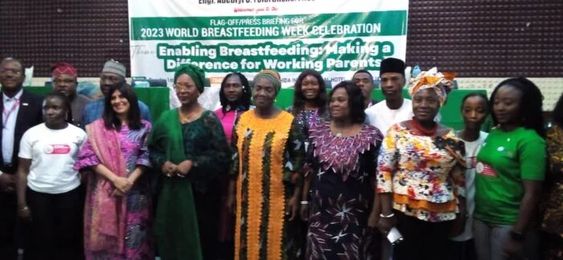Health
Governors’ wives and stakeholders are advocating for 6-month maternity leave policy

On Tuesday, the Nigerian Governors’ Wives Forum (NGWF) and other stakeholders urged for the introduction of a six-month maternity leave policy in order to encourage exclusive breastfeeding of infants in the country.
The NGWF was represented by Dr Olufolake Abdulrazak, wife of Kwara state governor, at the kickoff and press briefing ceremony in Abuja to commemorate the 2023 World Breastfeeding Week held by the Federal Ministry of Health and other partners.
“Enabling Breastfeeding: Making a Difference for Working Parents” is the topic of this year’s commemoration.
Mrs. Abdulrazak stated that the forum will work with others to promote the advocacy, which will improve the health and well-being of mothers and children, as well as eliminating malnutrition in the country, lowering child mortality rates.
She emphasised the difficulties that mothers experience in juggling their work schedules and providing the greatest care for their children, emphasising the importance of enacting policies that ensure newborns are exclusively breastfed for the first six months and supplemented fed for at least two years.
“Breastfeeding is essential for the healthy development of infants, and we must all work together to create a supportive and encouraging environment for this natural practise.”
“The NGWF is devoted to championing the cause of breastfeeding and improving the lives of women and children across our country.”
“We are pleased to announce that we have taken a significant step forward by signing a statement of commitment to provide support for improved nutrition in the country through effective advocacy.”
While advocating for realistic budgeting and the prompt provision of nutrition money, she stated that the NWGF was dedicated to raising awareness about the need of exclusive breastfeeding, establishing creches in workplaces, and advocating for six months paid maternity leave.
In terms of malaria prevalence, she said that Kwara state dropped to 20%, which was lower than the national average of 26%.
According to UNICEF’s Chief Nutrition Officer, Dr. Nemat Hajeebhoy, a child’s development is not complete at birth, but breastfeeding aids in the completion of development, particularly the brain.
Hajeebhoy went on to say that the Convention on the Rights of the Child guarantees their right to appropriate nutrition, which begins at birth and continues during the first hour of breastfeeding, which serves as the first immunisation.
“Breastfeeding and breast milk allow babies to grow.” Breastmilk assists in the completion of the child’s growth, particularly in and brain development.
“So it is each of our responsibility to allow mothers and babies to be together once the child is no longer in her womb,” she said.
She added that Nigeria has over 18 million employed women, but only 9% of firms provide breastfeeding support, highlighting the need for employers to develop breastfeeding-friendly policies.
“We are asking employers to provide six months of maternity leave, to create safe spaces in the workplace where a mother can breastfeed her child, and to provide some flexible working arrangements.”
In addition, Dr Walter Mulombo, Country Representative for the World Health Organisation (WHO), stated that the 2023 World Breastfeeding Week theme is to promote awareness and galvanise action to allow breastfeeding in the workplace.
“Improving breastfeeding practises and ensuring the health and wellbeing of both infants and mothers requires enabling breastfeeding and supporting working parents.”
“Breastfeeding support improves women’s job motivation, attendance, satisfaction, and productivity.”
“It also provides important health and nutritional benefits to children, with long-term benefits.” “Women should not have to choose between breastfeeding and working,” he stated.
Dr. Osita Okonkwo, Country Director of Nutrition International, stated that by 2022, the organisation will have delivered over 20 million vitamin A tablets across states, with over 22 million designated to promote nutrition and reduce the prevalence of child and maternal mortality.
While underlining the benefits of breastfeeding, Mr. Adebiyi Folorunsho, Permanent Secretary, FMoH, stated that just 9% of firms in the country have a workplace breastfeeding policy.
Folurunsho, represented by Mrs Boladale Alonge, Director at the ministry, stated that breastfeeding gives energy and nutrients for a child’s development, reduces the burden of malnutrition, infectious diseases, and mortality, and lowers the risk of obesity and chronic diseases later in life.
He went on to say that breastfeeding mothers are also protected against chronic diseases such as breast and ovarian cancer, Type 2 diabetes, and enhance productivity at work while saving money.
“Evidence suggests that adequate time and support are required for women to practise optimal breastfeeding.” “One of the reasons why women stop breastfeeding early is a lack of support at work,” he explained.
Representatives from the Federal Ministries of Women Affairs, Labour and Employment, Humanitarian Services, Disaster Management, and Social Development, as well as the Nigeria Labour Congress (NLC) and other stakeholders, according to the News Agency of Nigeria (NAN), were present at the occasion.
According to NAN, UNICEF notes that seven of the 36 states give six months of fully paid maternity leave, yet only 34% of children aged zero to six months are exclusively breastfed, as recommended. (NAN)
